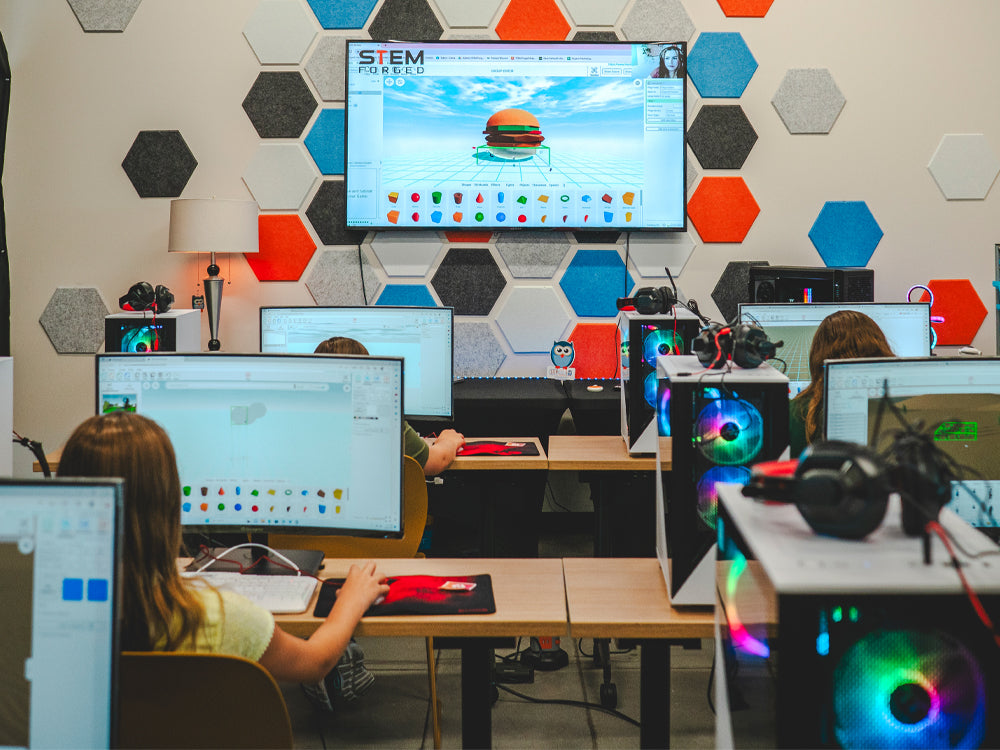
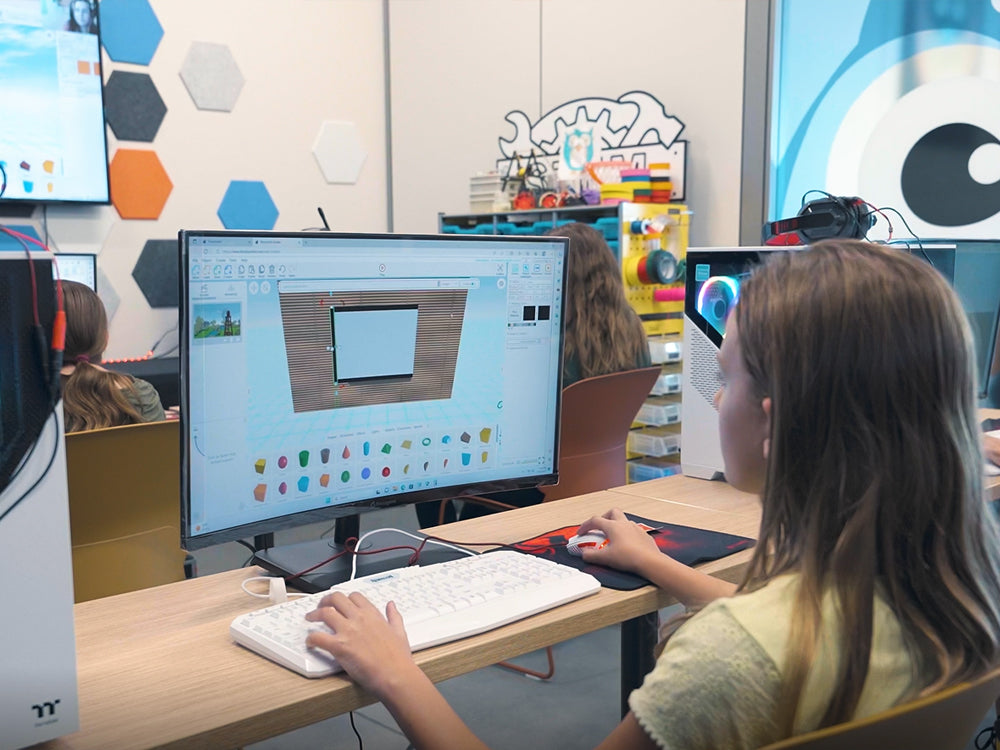
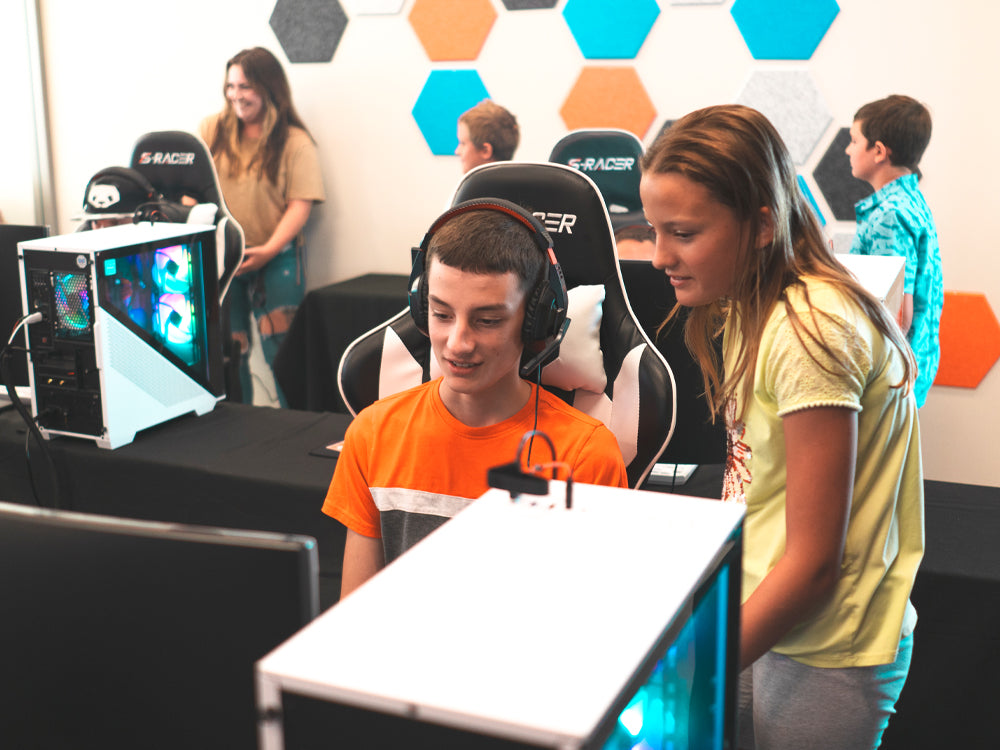
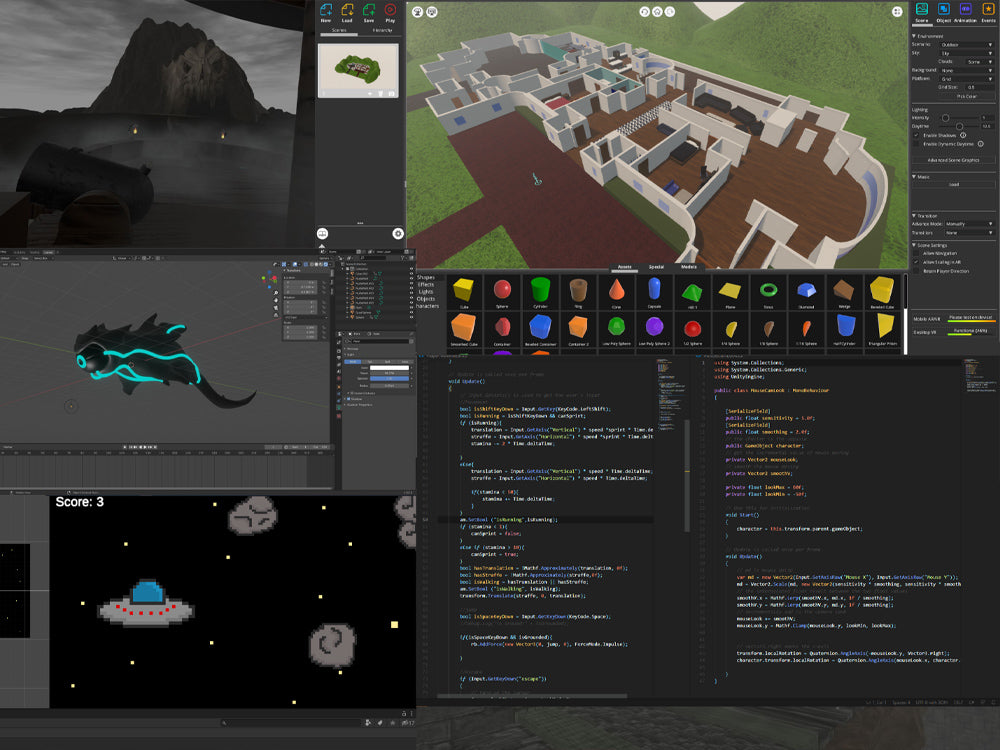
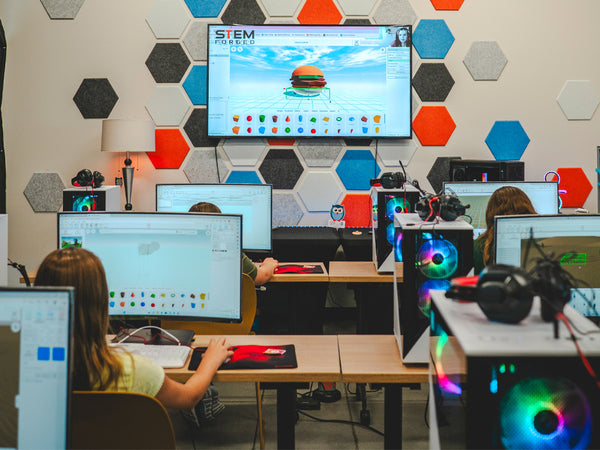
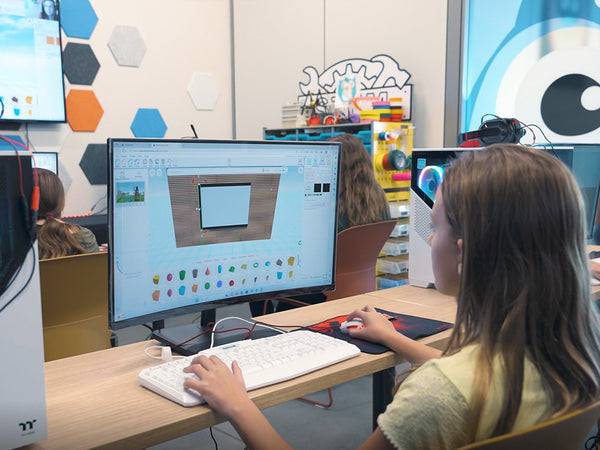
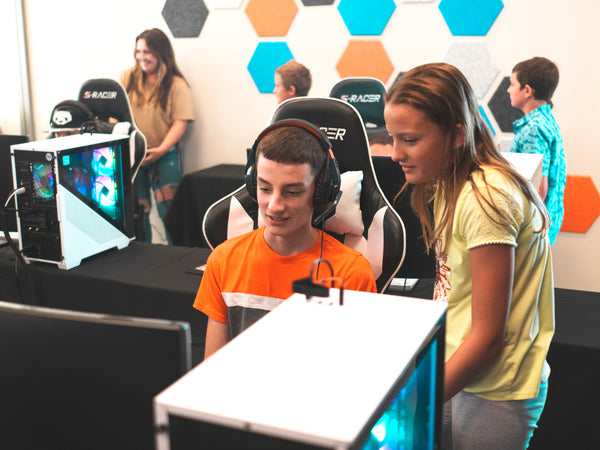
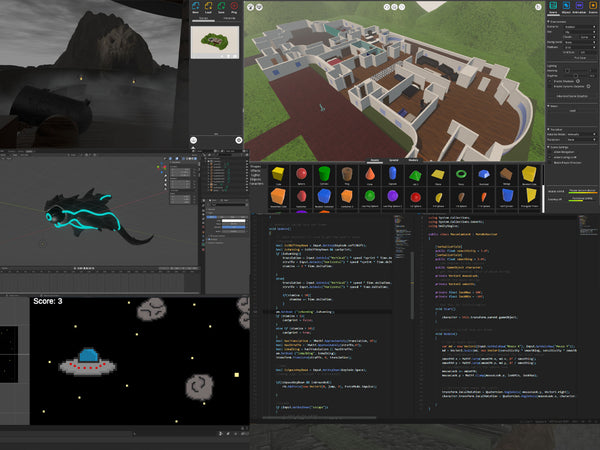




Game Design (with Virtual Instructors)
- Price
- 4,695 USD
Unlock Student Creativity with Expert-Led Game Design Programs
Expert remote instructors teach STEM skills through project-based game design courses. This comprehensive program combines software, curriculum and instructors into an integrated, easy-to-implement program for grades 4-12.
Highly-capable instructors guide students through their game design projects, providing expert support and personalized feedback.
All STEM Forged programs come with an online portal that gives educators and administrators a view of students’ progress. This portal tracks student progress, giving administrators meaningful data about student and program performance.
For custom options, consult a STEM Program Specialist
Grades: 4-12
Students: Groups of 30
Contact Hours: 20-170, custom options available
Customized to Your Needs:
| 30 or 60 Hours | 170 Hours | Consult a STEM Program Specialist | |
|---|---|---|---|
| Remote Instructor | Included | Included | Included |
| Contact Hours per Week | Up to 2 | Up to 5 | 10+ |
| ISTE-Aligned Curriculum | Included | Included | Included |
| Game Design Software | License Included | License Included | License Included |
| IT Support | Included | Included | Included |
| Customized Marketing Materials | Included | Included | Included |
| Grading | - | Included | Included |
| Custom Learning Objectives | - | Included | Included |
| Tutoring | - | - | Available |
Subject Targets:
Technology, Engineering Design, Coding, Art/STEAM, Math Connections
Reusability and Expansion:
- Annual Subscription: Renew to keep expanding on game design knowledge and topics.
Settings & Tech Requirements
Recommended Settings:
- Classrooms
- Before & After-School Programs
- CTE
- Home Learning
Tech Requirements:
- 1 Windows, Mac, or Chromebook computer per student.
- Internet Connection
- Mouse
Minimum Specs:
- Memory: 2 GB
- CPU: Intel Celeron 2GHz class (or AMD equivalent)
- GPU: Intel HD
- OS: Windows 7 or Chrome OS (with Intel chipset)
Recommended Specs:
- Memory: 4 GB
- CPU: Intel i5/i7 Class (or AMD equivalent)
- GPU: Nvidia 900/1000 class
- OS: Windows 10 or Mac
Curriculum Topics
Each Activity Includes:
- Remote, dedicated instructor to teach curriculum
- Vocabulary
- ISTE Standard concepts
- Real-world application concepts
- Expansions
Curriculum Topics:
- 3D Modeling Techniques
- Building with a Theme
- Animation
- Event Systems
- Trigger Systems
- Variables
- Hit Points
- Spawners and Navigation
- Multiplayer Lobby Creation
- Mechanics
- Playtesting
- Constructive Feedback
Professional Development
Product Orientation:
- Guided setup and 1-hour orientation included
Materials
Each Program Includes:
- Remote Instructor
- ISTE-Aligned Curriculum
- Game Design Software License
- IT Support
- Customized Marketing Materials
Grading, Custom Learning Objectives and Tutoring are also available. Reach out to a STEM Program Specialist for details.
Standards & Alignment
Habits of Mind:
16 thinking habits developed by Art Costa and Bena Kallick to empower students to succeed in a 21st-century learning environment.
- Persisting
- Thinking Flexibly
- Striving for Accuracy
- Questioning and Posing Problems
- Applying Past Knowledge to New Situations
- Creating, Imagining, Innovating
- Taking Responsible Risks
- Thinking Interdependently
- Remaining Open to Continuous Learning
21st Century Skills:
A set of widely-applicable abilities essential for success in the information age.
- Creativity and Innovation
- Critical Thinking and Problem Solving
- Communication
- Collaboration
- Information Literacy
- Media Literacy
- ICT (Information, Communications, and Technology) Literacy
- Flexibility and Adaptability
- Initiative and Self-Direction
- Productivity and Accountability
© 2018 Partnership for 21st Century Learning (P21), p21.org. All Rights Reserved. P21 was not involved in the production of this product and does not endorse it.
International Society for Technology in Education:
- 1.1 Empowered Learner
- 1.2 Digital Citizen
- 1.3 Knowledge Constructor
- 1.4 Innovative Designer
- 1.5 Computational Thinker
- 1.6 Creative Communicator
- 1.7 Global Collaborator
ISTE Standards for Students, ©2016, ISTE® (International Society for Technology in Education), iste.org All rights reserved. ISTE was not involved in the production of this product and does not endorse it.
National Core Arts Standards:
- Anchor Standard #1: Generate and conceptualize artistic ideas and work.
- Anchor Standard #2: Organize and develop artistic ideas and work.
- Anchor Standard #3: Refine and complete artistic work.
- Anchor Standard #7: Perceive and analyze artistic work.
- Anchor Standard #8: Interpret intent and meaning from artistic work.
Idaho Computer Science Standards:
While computer science standards vary from state-to-state, we hope this list of the Idaho State Standards provides a useful starting point for your alignment.
- 6-8.CS.02: Compare and contrast the ways that humans and machines process instructions and sense the world.
- 6-8.CS.04: Apply troubleshooting strategies for solving hardware
and software problems (e.g. recognizing, describing, reproducing,
isolating, fixing and retesting). - 6-8.IC.02: Explore how computer science fosters innovation and enhances other careers and disciplines.
- 6-8.IC.03: Describe ethical issues that relate to computers and
networks (e.g. equity of access, security, privacy, ownership and
information sharing, copyright, licensing). - 6-8.IC.05: Design, develop, and present computational artifacts
that have a positive social impact (e.g. web pages, mobile applications,
animations). - 9-10.IC.04: Describe how computer science shares features with creating and designing an artifact such as in music and art.
About the Author
STEM Forged
STEM Forged is passionate about bridging the gap in education through the exciting world of esports, game design, and gamified learning.
Their mission is to empower schools that may be lacking in resources and expertise by delivering comprehensive programs that engage and inspire students.
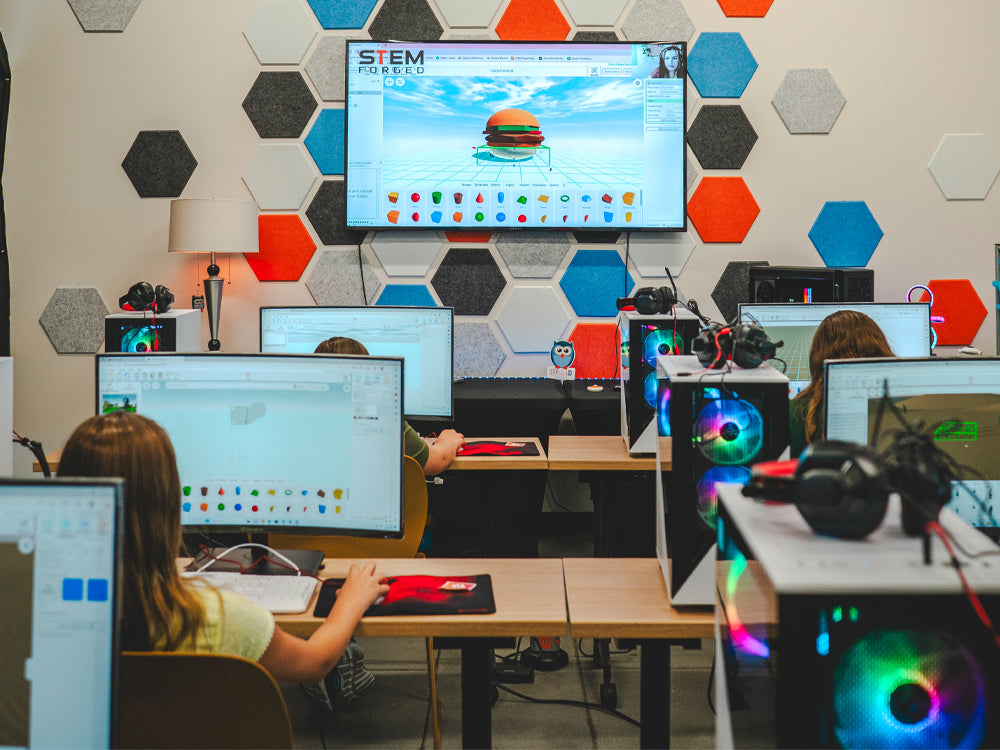
Game Design (with Virtual Instructors)
Pricing Options:
- Complete Program (30 Students, 30 Hours): 4,695.00 USD
- Complete Program (30 Students, 60 Hours): 6,995.00 USD
- Complete Program (30 Students, 170 Hours): 18,495.00 USD
Recommended Settings:
- Classrooms
- Before & After-School Programs
- CTE
- Home Learning
Tech Requirements:
- 1 Windows, Mac, or Chromebook computer per student.
- Internet Connection
- Mouse
Minimum Specs:
- Memory: 2 GB
- CPU: Intel Celeron 2GHz class (or AMD equivalent)
- GPU: Intel HD
- OS: Windows 7 or Chrome OS (with Intel chipset)
Recommended Specs:
- Memory: 4 GB
- CPU: Intel i5/i7 Class (or AMD equivalent)
- GPU: Nvidia 900/1000 class
- OS: Windows 10 or Mac
Each Activity Includes:
- Remote, dedicated instructor to teach curriculum
- Vocabulary
- ISTE Standard concepts
- Real-world application concepts
- Expansions
Curriculum Topics:
- 3D Modeling Techniques
- Building with a Theme
- Animation
- Event Systems
- Trigger Systems
- Variables
- Hit Points
- Spawners and Navigation
- Multiplayer Lobby Creation
- Mechanics
- Playtesting
- Constructive Feedback
Product Orientation:
- Guided setup and 1-hour orientation included
Each Program Includes:
- Remote Instructor
- ISTE-Aligned Curriculum
- Game Design Software License
- IT Support
- Customized Marketing Materials
Grading, Custom Learning Objectives and Tutoring are also available. Reach out to a STEM Program Specialist for details.
Habits of Mind:
16 thinking habits developed by Art Costa and Bena Kallick to empower students to succeed in a 21st-century learning environment.
- Persisting
- Thinking Flexibly
- Striving for Accuracy
- Questioning and Posing Problems
- Applying Past Knowledge to New Situations
- Creating, Imagining, Innovating
- Taking Responsible Risks
- Thinking Interdependently
- Remaining Open to Continuous Learning
21st Century Skills:
A set of widely-applicable abilities essential for success in the information age.
- Creativity and Innovation
- Critical Thinking and Problem Solving
- Communication
- Collaboration
- Information Literacy
- Media Literacy
- ICT (Information, Communications, and Technology) Literacy
- Flexibility and Adaptability
- Initiative and Self-Direction
- Productivity and Accountability
© 2018 Partnership for 21st Century Learning (P21), p21.org. All Rights Reserved. P21 was not involved in the production of this product and does not endorse it.
International Society for Technology in Education:
- 1.1 Empowered Learner
- 1.2 Digital Citizen
- 1.3 Knowledge Constructor
- 1.4 Innovative Designer
- 1.5 Computational Thinker
- 1.6 Creative Communicator
- 1.7 Global Collaborator
ISTE Standards for Students, ©2016, ISTE® (International Society for Technology in Education), iste.org All rights reserved. ISTE was not involved in the production of this product and does not endorse it.
National Core Arts Standards:
- Anchor Standard #1: Generate and conceptualize artistic ideas and work.
- Anchor Standard #2: Organize and develop artistic ideas and work.
- Anchor Standard #3: Refine and complete artistic work.
- Anchor Standard #7: Perceive and analyze artistic work.
- Anchor Standard #8: Interpret intent and meaning from artistic work.
Idaho Computer Science Standards:
While computer science standards vary from state-to-state, we hope this list of the Idaho State Standards provides a useful starting point for your alignment.
- 6-8.CS.02: Compare and contrast the ways that humans and machines process instructions and sense the world.
- 6-8.CS.04: Apply troubleshooting strategies for solving hardware
and software problems (e.g. recognizing, describing, reproducing,
isolating, fixing and retesting). - 6-8.IC.02: Explore how computer science fosters innovation and enhances other careers and disciplines.
- 6-8.IC.03: Describe ethical issues that relate to computers and
networks (e.g. equity of access, security, privacy, ownership and
information sharing, copyright, licensing). - 6-8.IC.05: Design, develop, and present computational artifacts
that have a positive social impact (e.g. web pages, mobile applications,
animations). - 9-10.IC.04: Describe how computer science shares features with creating and designing an artifact such as in music and art.
STEM Forged
STEM Forged is passionate about bridging the gap in education through the exciting world of esports, game design, and gamified learning.
Their mission is to empower schools that may be lacking in resources and expertise by delivering comprehensive programs that engage and inspire students.







